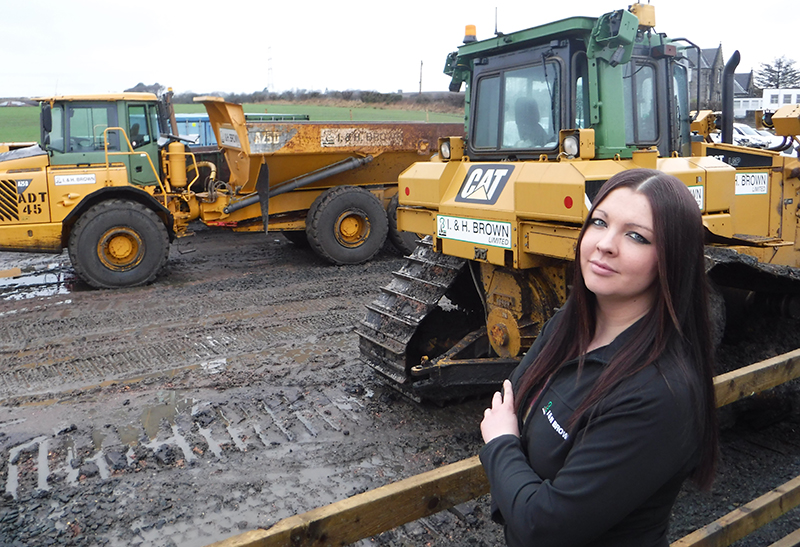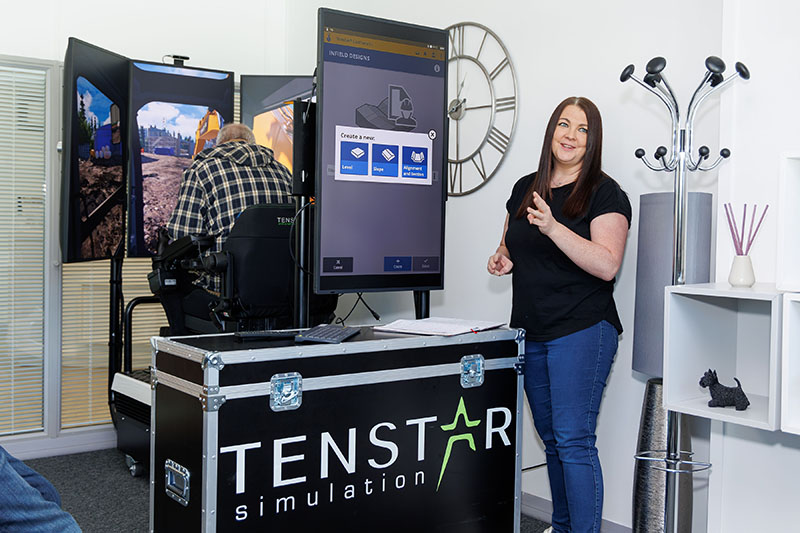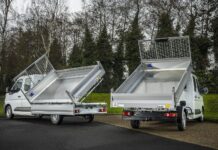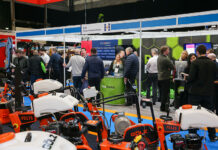
Gail McEwen is director and lead trainer at Setting Out For Construction. She was recently named as co-chair of the new SPOA Women in Plant working group, designed to better represent the interests of women in the sector and help attract more females into the industry.
Gail is a qualified plant operator, civil engineer, and approved CITB trainer.
She recently told Project Plant about the moment she realised this was the career for her, removing barriers to women entering the plant industry, and finding a gold bracelet on one excavation project with the help of a wandering dog…
Q) What’s your background?
A) I began my career in construction in Western Australia, working on iron ore mining infrastructure. I went on to become a plant operator, starting on rollers and dumpers, then excavators, dozers and graders. When I returned to the UK, I decided to study civil engineering at college as I was always fascinated with the geotechnical aspects of construction, while working full-time as a trainee site engineer.
On completion of my HNC, I was promoted to site engineer, went to Glasgow Caledonian University to study environmental civil engineering and obtained a first class BSc (hons). I became very involved with the training and mentoring of graduates and apprentice engineers, which led me to join Saffron Grant at Setting Out For Construction (SOFC).
SOFC is a prominent training business which specialises in training for site engineers, groundworkers, and plant operators in areas such as levelling, setting out, machine control, engineering software, drones, and more. I am now director of SOFC and in addition to my day to day duties of running the business, I am still an active trainer and often operate plant and carry out project/contract management and/or site engineering tasks for a handful of our clients.
I am now in the process obtaining my PhD with focus on the digital transformation of the construction sector.
Q) What does your current role at Setting Out For Construction involve?
A) As director of SOFC, I am responsible for all aspects of the business including client relations, strategic planning, project management and the successful delivery of high-quality construction-related training.
Our client base ranges between people self-funding the courses to construction businesses of all sizes. We find many self-funding delegates are those who are looking to upskill, such as groundworkers or plant operators, who want to be empowered to carry out some of the tasks which are traditionally carried out by the site engineer, such as levelling and basic setting out. With the looming skills shortage within the industry, SOFC nurture the growth and development of our delegates to allow them to do their jobs to the best of their abilities.
In addition, we work in partnership with many construction businesses to deliver our suite of courses for their plant operators, groundworkers, site engineers, and project managers.
Courses are refined to incorporate individual company processes and procedures, which allows their workforce to be trained to these standards, but also to the standards of the wider industry.
Q) What are some of the latest courses available?
A) We run regular courses in machine control for plant operators, machine control for site engineers, levelling, total station, CAD, 3D mapping and modelling software, GNSS, drone use in construction, and laser scanning throughout the year. Most of our courses are held every four weeks as open courses, but dates can be held for those looking to book in-house training.
SOFC is part of the CITB working groups for all of these standards, which allows us to collaborate with other key stakeholders, industry experts, and decision makers to ensure our courses are serving the needs of the construction sector. It is also partly the reason why I continue the on-site roles, to ensure we understand new challenges or innovations within the industry.
Q) What are the aims of the new SPOA Women in Plant working group?
A) The group has been formed to better represent the interests of women in plant and to work towards further improving the industry and attract more women. The WiP group provides role models for those who are considering a career in plant and offers a platform for networking and collaboration for those already established. The group also aims to showcase the invaluable contributions made by women within the sector, serving as role models for not only women but also for men.
The working group regularly meets to discuss key areas of the difficulties women experience in the industry such as traditional, ill-fitting PPE and restroom amenities. The group devises actionable plans to address such issues and aims to raise awareness among employers and industry players about these areas to help drive positive change for women in the industry.
Q) What are some of the barriers currently preventing women from entering the industry?
A) The current barriers vary depending on circumstances. Young women who are leaving school may not consider a career in plant or construction, as the industry can sometimes be marketed for males. Written materials about construction such as information booklets or flyers still often contain ‘male coded language’, which can even subconsciously deter women from it completely. Additionally, construction and more specifically plant, is not well represented in schools. We find many people within the industry were introduced to it through a family member rather than from information elsewhere.
On the other hand, women are still deemed the primary care givers at home. The construction sector is demanding of time, which is precious to those who have a family or other commitments. Often, women feel they need to make a choice between their career in construction and their family, which may be acting as an initial deterrent for females.
Those with older children who may be considering a career change may face a different challenge. Women in this area may not be informed enough about what plant operating is or how they would get started. The WiP group aims to provide the information they need about the industry and help drive a more inclusive and family-friendly working environment for both men and women.
Q) What advice would you have for young females – and males for that matter – about the opportunities available in the plant industry?
A) Reach out to the SPOA. No matter what your background, the SPOA will provide you with the information you need and support you. If construction interests you or you know a young person who has expressed an interest in construction or plant, please reach out to us and we will be more than happy to offer advice and guidance.
Q) What are the most memorable moments from your career?
A) The very first time I operated a 360 excavator. From a young age I had wanted to be in that seat and when it happened, it was very surreal. I didn’t think I would ever have been able to operate such a large machine, but it was very natural. This moment was the turning point for me and assured me that I loved construction and that I wanted to peruse a career in the industry.
Leading the engineering for a large project for the first time – we were working to 2mm tolerance – and when it came to the final tie in I was waiting for, it felt like a lifetime to watch the final structure placed. It landed successfully and that experience gave me the confidence to believe in my abilities.
Also, winning a CECA Scotland Most Promising Award. My employer had put me forward for the award and when I won, I was invited to the CECA dinner and presented with the award on stage. A very surreal moment.
Q) What’s the best advice you’ve ever received?
A) Always be accurate, never precise (more of an engineering bit of advice but has served me well). Many engineers are guilty of rushing to get the job done and don’t always cross check their work, which can result in very expensive errors arising.
Never assume anything – this is more directed at operating. Never assume permits are in place or areas have been scanned before you excavate.
Q) Any funny anecdotes from your career?
A) While I was excavating an embankment on some farmland, a golden retriever appeared out of nowhere, ran towards my bucket and started to dig where I had been excavating. Horrified, I got out the cab to look for the owner and when I looked down into the freshly (dog) excavated area, I noticed she had found something. I picked it up, cleaned it down, and found it was an old golden bracelet.
After a few cuddles with my new-found friend, her owner was frantically calling from behind the fencing and was safely returned. As it turned out, the site had been an area of interest for archaeologists, but that section hadn’t been trenched during their time on site. The bracelet was dated around 1850 and was added to the collection of other objects discovered and displayed for local residents at a community event.
Q) How do you relax when you’re not working?
A) Relaxing is not really in my nature. I am always looking for something to do. I have two young daughters who are of similar nature so when I am not working, I spend my time on activities with them to get them outdoors and getting their hands dirty.












